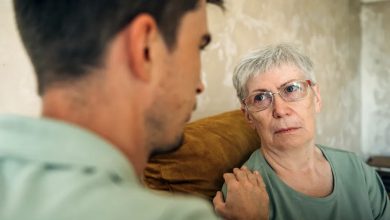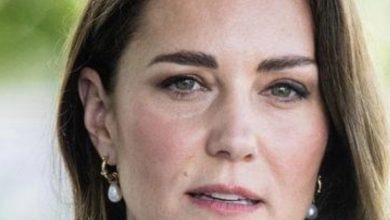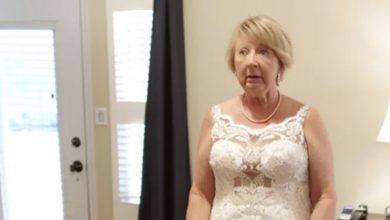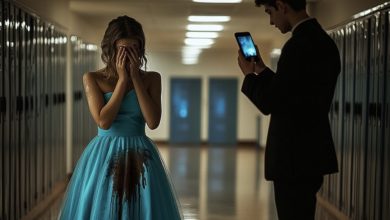They Called Me a Hero for Saving Their Baby — Then Tried to Ruin My Life in Court Until One Video Exposed the Truth
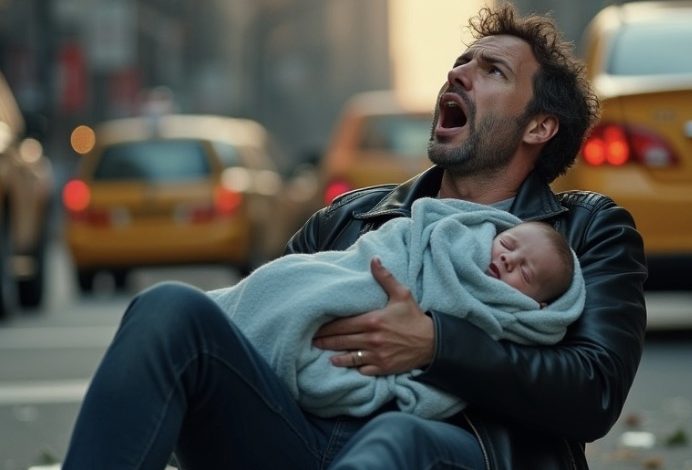
I caught a baby falling from a fifth-floor window, and for a moment, the world called me a hero. A week later, that same world turned against me. The baby’s parents—people who had hugged me and thanked me—were suing me for two million dollars, claiming I had hurt the child with my “reckless rescue.”
It happened on an ordinary Tuesday afternoon. I had just left the office, walking home through downtown Chicago, when a scream pierced through the hum of traffic. I looked up instinctively—and froze. A baby was falling.
It was one of those moments where time doesn’t move in seconds but in flashes. I saw a blur of pink against the red brick wall. I didn’t think. My body simply moved. My briefcase hit the ground, papers scattering like snow as I lunged forward. I opened my arms, bracing myself for the impact.
The weight hit me like a hammer. The baby’s body landed against my chest, and I crumpled backward onto the sidewalk, curling around the small form as tightly as I could. Pain shot through my ribs, but I didn’t care. The world went silent for a heartbeat—then I heard it. A soft, fragile cry. The baby was alive.
People screamed. A woman’s voice cried out from above. Within seconds, a couple rushed out of the building—Mark and Carol Peterson, though I didn’t know their names yet. The mother fell to her knees, tears pouring down her face. “Oh my God, you saved him!” she sobbed. The father hugged me, shaking uncontrollably. “Thank you,” he said, his voice breaking.
An ambulance arrived minutes later. I went with them, answering questions, still trembling. The baby had bruises but was breathing. At the hospital, doctors told the parents their son would recover. They called me a hero on the evening news. People online shared my story. For a few days, I believed that humanity was good—that I had done something that mattered.
Then, one week later, everything changed.
There was a knock on my apartment door. A man in a suit handed me an envelope. Inside were legal papers. I remember rereading the words over and over: Plaintiff: Mark and Carol Peterson. Defendant: Michael Reed. They were suing me for two million dollars in damages. The claim? That my “reckless and untrained” actions had caused multiple fractures in their child’s arms and legs.
I called them repeatedly, desperate to understand. No answer. Finally, I went to their apartment. The father opened the door. His face, once full of gratitude, was now twisted with anger. “You broke our baby,” he spat. “Get away from us before I call the cops.” The door slammed.
I stood in the hallway, numb.
The next morning, I met my court-appointed attorney, Mr. Ramsay, a tired man in his fifties with half-moon circles under his eyes. His office looked like it hadn’t been cleaned in years. “This is a tough one,” he said, flipping through my file. “You caused the injuries, technically. Doesn’t matter that you were trying to help.”
“But I saved his life!” I protested. “Without me, that baby would’ve died!”
He shrugged. “The law doesn’t care about intentions, just outcomes. You should take the plea deal.”
The preliminary hearing was a nightmare. The prosecutor, Mr. Davies, was smooth and confident. He stood before the jury, pointing at enlarged x-rays of the baby’s broken bones. “This,” he said dramatically, “is the result of the defendant’s reckless actions.”
Then came the parents’ testimony. Carol cried on the stand, saying I’d “snatched” the baby out of the air instead of letting it fall safely onto the bushes below. Mark claimed I had “crushed” their child in my arms. They described sleepless nights and medical bills, their voices full of pain.
When my turn came, I tried to explain that I had simply reacted. That any delay—any hesitation—would have meant the baby hitting concrete instead of my chest. But I could tell from the judge’s expression that none of it mattered.
Reporters hounded me outside the courthouse. Online, strangers called me a fraud, a glory-seeker who’d injured a child for attention. The same people who’d once called me a hero now said I should be in prison.
Three weeks later, my lawyer called. “The prosecution is offering three years in prison,” he said. “It’s your best chance.”
I refused. I wasn’t guilty.
The trial began two months later. The courtroom was full. The parents sat in the front row, dressed in black, looking broken and fragile. The prosecutor presented his case like a movie, complete with medical experts who said my “technique” had been dangerous. My lawyer barely spoke. I could see it in the judge’s eyes—she’d already made up her mind.
By the final day, I had lost all hope. The prosecutor finished his closing statement, describing me as “a man who let ego override common sense.” The judge nodded slightly, her pen poised above her notes.
“Does the defense have anything further?” she asked.
Mr. Ramsay sighed. “No, Your Honor.”
The judge adjusted her glasses. “Then I will now deliver—”
The courtroom doors flew open.
A young woman entered, limping heavily, one leg in a cast. The sound of her crutches echoed as she made her way forward. Everyone turned. The parents’ faces drained of color.
“Who are you?” the judge asked sharply.
“My name is Ashley Rodriguez,” the woman said, breathless but determined. “And I have evidence about what really happened.”
The courtroom went still.
Ashley handed her phone to the bailiff, who passed it to the judge. The judge watched the video, her face tightening with each passing second. “Bailiff,” she said finally, her voice hard as iron. “Lock the doors. Nobody leaves this courtroom.”
She connected the phone to the large courtroom monitor. The video began to play.
The timestamp showed it had been filmed minutes before the baby fell. The parents stood at the window.
Mark’s voice was unmistakable. “He’s there. Right below the window, just like yesterday.”
Carol’s voice followed. “You’re sure this will work? The lawyer said we can sue if there’s an injury.”
“As long as it’s bad enough,” Mark replied. “We’ll say he fell. He’ll catch him—he always takes this route home.”
Carol lifted the baby into view. “What if he misses?”
“He won’t,” Mark said. “He’s predictable. Now drop him. Remember the story: the baby slipped. He caught him. Perfect.”
Then—horrifyingly—the baby was dropped.
Gasps filled the courtroom. The video continued: the parents watched from the window. “He caught him!” Mark said, almost gleeful.
“Is he hurt?” Carol asked. “We need him to be hurt.”
Then they ran for the door.
The video ended.
The courtroom erupted into chaos. People were shouting. The parents screamed, “It’s fake! She edited it!” But Ashley limped forward again, pulling out a folder thick with documents.
“I have proof this is real,” she said, handing it to the judge. “Financial records, medical reports—everything.”
The judge flipped through the pages, her face darkening. The sound of her gavel striking the desk silenced the room. “Enough,” she thundered. “Mr. and Mrs. Peterson, you are under arrest for child abuse, fraud, and attempted extortion.”
Two bailiffs moved quickly. Mark tried to run but was tackled to the floor. Carol screamed, tears streaking her makeup. “We did it for our baby! We needed the money!”
The judge ignored her. “All charges against Mr. Reed are dismissed with prejudice,” she declared. “Court adjourned.”
I sat frozen. My brain couldn’t process it. I was free.
Ashley came over, her eyes soft but tired. “I used to live with them,” she said quietly. “They fostered me. I saw what they did to other kids. They’d stage accidents and sue people. I recorded that video because I knew they’d try it again.”
I couldn’t speak. I just nodded, tears burning my eyes. “You saved me,” I finally whispered.
“No,” she said gently. “You saved that baby. I just made sure the truth didn’t die with the lies.”
In the months that followed, everything came out. The Petersons had been running scams for years—fake insurance claims, injury suits, even staged car crashes. The baby was taken into protective custody. Ashley testified again, brave and unshaken, and the couple went to prison for over a decade.
Life didn’t go back to normal overnight. My name was cleared, but the scars remained. The internet forgot quickly, but I didn’t.
Ashley and I stayed in touch. Together, we founded a small charity to help people wrongly accused in civil suits. The baby—now a smiling toddler—was adopted by a loving family who invited me to his second birthday. He hugged me without hesitation, and for the first time in years, I felt peace.
Years later, I received a letter from prison. It was from Mark Peterson. He apologized, saying he didn’t expect forgiveness—just that he finally understood the pain he’d caused. I never replied, but I kept the letter.
On the anniversary of that day, I stood on the same street where it all happened. The traffic moved, the world kept turning. But I still remembered the sound—the scream, the fall, the cry of life.
For a few seconds, I’d been called a hero. Then a criminal. Now, I was simply human—a man who did the right thing and almost lost everything for it.
But as I looked up at that fifth-floor window, one thought stayed with me:
I’d do it again. Every single time.

